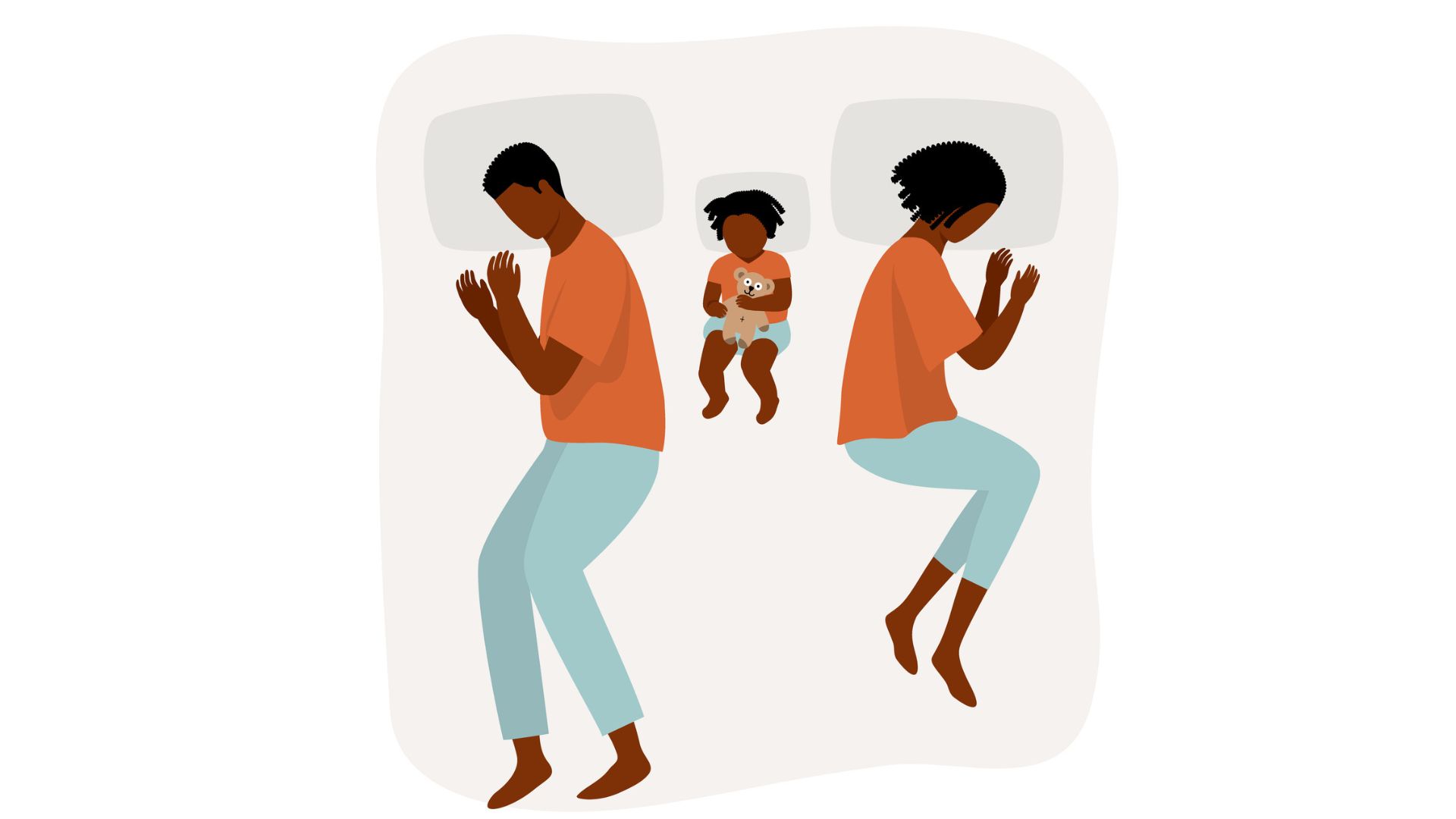
In a world where parents talk openly about birth stories, cracked nipples, and mental health struggles, there is still one area of our life that we remain tight-lipped on – how much sex parents with young children are really having? Cat Sims asks around...
Sex survey (of 907 of my Instagram followers) at a glance:
- 83% of you agreed that tiredness is a barrier to having sex
- 60% feel like sex has become another box to tick on the mental load list
- 23% admit to never having sex post-kids
- 54% say that your partner wants more sex than you have the energy to give
If your post-partum sex life isn't quite where you want it to be, that's okay and you're not alone. From a personal point of view, I’ll hold my hands up and admit that I often feel like my husband and I are having far less sex than we are ‘supposed’ to be having. Before we had children, we’d invest in sex toys and put them to good use. I’m not ashamed to admit that I once bought a black, latex minidress that I looked so good in, I wanted to have sex with myself. In stark contrast, I received a cock-ring in a goody bag which has sat collecting dust for two years.
We're told by friends, our mums, magazines, Hollywood, and well society-in-general, that a healthy sex life is the cornerstone of a successful relationship, there are even articles on 'how to spice up your relationship'. Sure, we get six weeks, post-partum, to give our vulvas and vaginas a chance to recover from a baby clawing its way out before we can allow sex to resume, but after that, healthy marriages get their sex lives right back on track, don’t they?
Not in my world and, based on a very scientific survey I ran (read: not scientific in the slightest) there’s not a lot of rumbling between the sheets going on for any of you unless you’re one of the thirteen respondents out of 907 who said they were having sex at least three times a week to which my first response is ‘Way to go!’ quickly followed by my second response which is, “Who has the time!?” Also, once you’ve hoofed out a kid or two via your ‘love tunnel’, there’s not a lot that is sexy about life, for a while at least. Kids are great but they bring with them an overwhelming amount of stress, exhaustion, money worries, and life admin. By the time you’ve fought your way through the day, making sure everyone is fed, the bills are paid, there’s food in the fridge, the house is clean and there are fresh undies in everyone’s drawers, sex feels like a herculean task to wrap up the day with.
I speak to Clio Wood, author of Get Your Mojo Back and founder of the online community @andbreathewellbeing and she agrees. “Let’s face it, we’re so tired as parents, especially in early-years parenting, that sex is way down the list of priorities.”
In fact, a whopping 83% of you agreed that tiredness is a barrier to having sex, and while it’s easy to think that ‘early years’ may refer to preschool kids, a study recently suggested that parenting sucks the lifeblood out of us until our kids are at least seven years of age. They didn’t phrase it like that, but you know what I mean.
“It’s important to make time to connect with your partner, and with yourself [by spending time on your own],” says Clio. “It gives you a really solid foundation on which to build more intimacy, passion, and yes sex when you’re ready.”
But here’s the headline – you are never the only one. And when it comes to sex, it couldn’t be more accurate. Pre-kids, 37% of us were having sex 5-8 times a month, about twice a week. Post-kids, that number drops dramatically to 11% with 60% of you saying that you manage to find the strength, energy, and inclination to bump uglies 1-4 times a month once the ratbags land, and 23% of you are never having sex. While these results are not surprising, it’s always nice to see evidence that other couples aren’t drowning in orgasms either.
"83% agreed that tiredness is a barrier to having sex"
What was surprising – to me at least - is that 55% of you feel that a good sex life is integral to a healthy and successful relationship. Of course, sex is important, but integral? I don’t know whether I agree with that. I truly believe that the modern relationship has taken a serious beating at the hands of the rom-com – or the rom-con as I like to call it – which tells us that parents who are really in love are just itching to rip each other’s clothes off the minute they’ve finished reading a bedtime story. I don’t know about you, but reading Where the Wild Things Are for the eleventy-billionth time while I think about the mountain of laundry that awaits me and seethe silently because my husband left the loo seat up again, isn’t my idea of foreplay.
The mental load plays a big part
Clio tells me, ‘I don't think regular intercourse is key but regular and proper communication and intimacy is what will really make the difference in maintaining a marriage or long-term relationship.” And my opinion, as humble as it is, appears to be backed by science (well, by my survey at least). 72% of you said that you have a lower sex drive since having kids with 54% of you admitting that your partner wants more sex than you have the energy to give.
I’d love to say I’m shocked but of course, I’m not. If men bore the burden of the mental load in the same way that women do, they’d probably care less about getting down and dirty at the end of the day too, especially after they’ve spent all day getting down and dirty cleaning loos and laundry.

There’s a reason we call it ‘chore-play’ in our house – it’s not the act of watching my husband put the dishes away that gives me fanny flutters; it’s the feeling that he’s keeping me in mind and thinking about how he can support me. If you are wary of how much the mental load affects our inclination to have sex with one of the people we spend an inordinate amount of time cleaning up after, it’s worth noting that 60% of women feel more attracted to their partner when they feel supported in the responsibilities of adulting. And interestingly, the same amount feels like sex has become another box to tick on the mental load list.
“The mental load plays a huge role in low libido,” explains Clio, “as does lack of sleep and high-stress levels, so life after kids is the perfect storm of low sexual desire. You’re also dealing with huge mental and physical changes which might need a great deal of rehab before sex can be pleasurable again – things like painful sex, vaginal dryness and changed body image – are very common.”
Body confidence
Most of us – those of us who aren’t Kylie Jenner at least – don’t ‘snap back’ to our pre-pregnancy bodies and even if we do lose the weight, there are still lumps where once smooth contours existed, varicose veins that pulse from our groins down to our ankles, stretch marks and vaginas that have literally been stitched back together. It doesn’t help that we know our husbands still think we’re gorgeous because we don’t think we’re gorgeous anymore and when you’re not feeling yourself, then you don’t really want anyone else to feel you too.
Dads struggle with body confidence too. They may not have built a human and expanded ten-fold in every direction while doing so, but parenthood in general isn’t conducive to looking after yourself. It’s much easier to eat well and go to the gym or for a run when you haven’t got a tiny terrorist demanding six different sandwich shapes and requesting that you watch every little thing they do. Living on a diet of left-over fish fingers and late-night bowls of cereal because it’s all you’ve got the energy to make, will bring out the dad-bod in anyone. And, yes, we all profess to love a ‘dad-bod’ but it doesn’t mean that dads love their dad-bods.
"It’s always nice to see evidence that other couples aren’t drowning in orgasms either."
Lets talk about it
The fact is, we’re just not talking about it enough, with each other or with our partners. From personal experience, I can tell you that I have felt despondent and concerned about what our lacklustre sex life means for our relationship. I’ve spent a lot of time worrying about what it says about our relationship because, in my mind, you’re all having loads of sex but that’s not the truth. The truth is, it’s weird if you are having tons of sex (incredible and we’re all very happy for you, but weird nonetheless). A severely reduced sex life is to be expected while your children are still young and by young I mean up to the age of ten (if my survey is anything to go by) and while that may seem like a long time, in the grand scheme of a partnership that we hope will last decades, it’s not actually that big of a deal.
When I let my concerns over how much sex we’re having hang heavy, I remind myself that I still fancy the pants off my husband, it’s just that, right now, there are other things that demand my time and energy. I’ve taken to telling him this too. “Babe,” I’ll say, “I want you to know that if I had the energy, I would shag you silly right now. Just because I physically can’t doesn’t mean I don’t want to.” He always smiles and nods, “Same babe.”
That’s one of Wood’s top tips. “Making sure you both know that you love and respect each other still, whether that’s through conversation, kissing, cuddles on the sofa or letting each other know you care through gifts, time, acts of service or just saying it…these things will ensure that when you can connect more fully, you’re ready and open to it.”
So, if you're not having lots of sex post-kids, you're not alone. It's more normal than you think.
Like what Cat has to say? Check out her other Goodto.com columns, she talks candidly about being the Sandwich Generation about how mothers need to own Mother's Day and forget everyone else, and the women who regret their divorces not to mention her thoughts on Kinkeeping and how dangerous this term really is.







